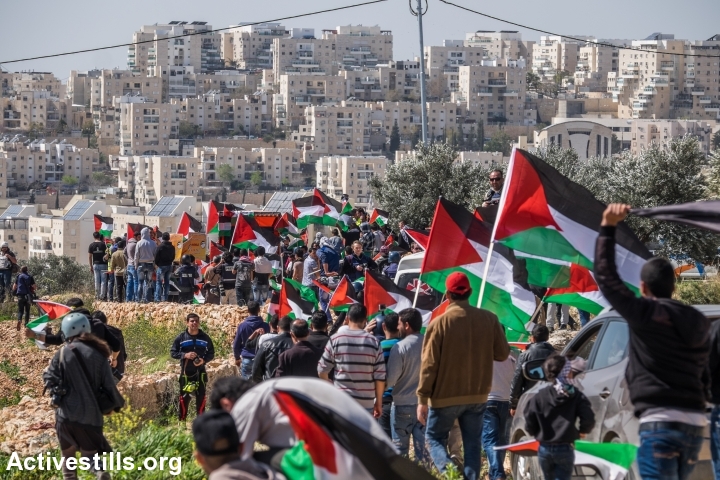Nearly a decade after an Israeli soldier killed Bassem Abu Rahmeh while he was nonviolently protesting in Bil’in, Israel’s High Court decides once and for all that his killer will never see the inside of a courtroom.

More than nine years after an Israeli soldier killed Palestinian activist Bassem Abu Rahmeh at a protest in Bil’in, Israel’s High Court of Justice rejected a third and final appeal against the army’s refusal to prosecute or punish anyone for his death.
The court, however, accused military police and prosecutors of handling the case with negligence, particularly for their inability to identify Abu Rahmeh’s killer.
Justice George Karra was particularly piercing, writing in the judgment that Israeli law enforcement officials’ conduct, “or rather, [their] failure to investigate, led to the spoliation of evidence, and to the inability to find the person responsible for the victim’s death. And that is regrettable.”
Abu Rahmeh, 30, was nonviolently protesting against the separation wall in Bil’in when an Israeli soldier fired an extended-range tear gas canister directly at his chest, against IDF regulations. The injury killed Abu Rahmeh almost immediately.
The unarmed, popular protests in Bil’in, a Palestinian village near the West Bank city of Ramallah, started in 2005. Residents and Israeli and Palestinian activists marched weekly to protest the separation wall, which cut them off from nearly 2,000 dunams of their agricultural land. Abu Rahmeh, one of the more prominent figures in the early days of the struggle, was featured in the Oscar-nominated film “Five Broken Cameras,” directed by Guy Davidi and Imad Burnat.
“This was supposed to be an easy case: a killing that was captured by three cameras, top experts identifying the source of the lethal shot, and a clear violation of the rules of engagement,” said Michael Sfard, one of the human rights attorneys representing Abu Rahmeh’s family and Yesh Din in the case. “Both the military police and the military prosecution have made it clear in this case that they will do anything they can to deny justice to the victim, and obstruct any chance of getting to the truth.”

Subhiyeh Abu Rahmeh, Bassem’s mother, first demanded that the military investigate her son’s death a few days after the April 17, 2009 incident with the help of two Israeli human rights organizations. Israel’s Military Advocate General (MAG) responded only a year later, declining to open an investigation, citing a lack of evidence.
The family’s lawyers at Yesh Din appealed the decision, submitting video recordings and expert analysis of the shooting, and threatening to petition the High Court of Justice. The MAG then changed its position, and ordered an investigation into the case.
Three years later, the State Attorney released the findings of the investigation to the High Court, stating that there was not enough evidence to pursue criminal proceedings against any of the soldiers involved in Abu Rahmeh’s killing. Abu Rahmeh’s mother filed a second appeal in March 2015, almost six years after the incident, challenging the MAG’s decision to close the investigation.
Among the evidence submitted by Yesh Din over the years were three video angles capturing the killing at the demonstration that day. Forensic imaging experts concluded from the imagery that the tear gas canister that killed Abu Rahmeh was fired directly at him, violating Israeli army regulations.
Furthermore, in testimony gathered by Breaking the Silence three-and-a-half years after the shooting, a soldier who served in the same military unit as Abu Rahmeh’s killer confirmed that those regulations had been violated that day. “[O]ne of the soldiers simply aimed at someone point-blank and it hit his chest and he got killed,” the unnamed soldier said. He added that the shooter bragged about killing Abu Rahmeh and later marked his weapon with an “X” to indicate the kill.
According to a Yesh Din data sheet, 79 percent of complaints received by MAG in 2016 were closed without investigation. Of the 78 cases that were investigated by the Military Police Criminal Investigations Division (MPCID) that year, only five resulted in indictments against soldiers for causing harm to Palestinians or their property in the West Bank and in the Gaza Strip.
The data also indicates that the number of investigations opened has dropped over the years: from 2013 to 2015, the MPCID launched an average of 205 investigations a year into such offenses, compared to 78 in 2016.
“It is clear today that crimes committed by soldiers against Palestinians are being endorsed by the army as yet another subjugation element over Palestinians, and that Palestinians cannot expect it to seriously investigate soldiers. Israel is unwilling to investigate its own war crimes, and that has far-reaching legal implications,” said Sfard.

